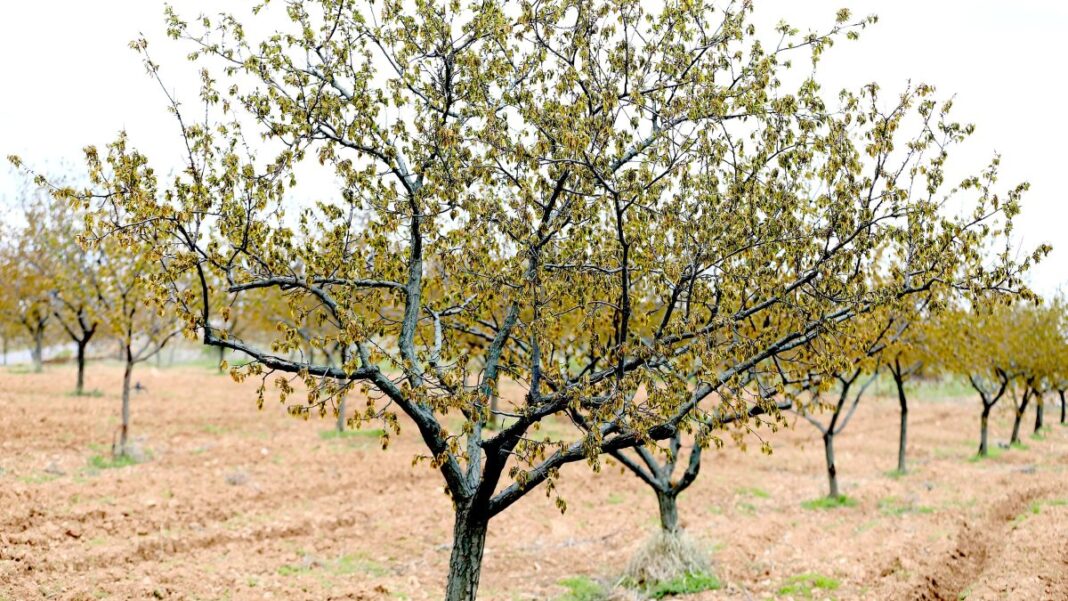A wave of severe frost that swept across much of Türkiye last week has inflicted significant damage on major fruit crops, including apricots, peaches and apples, fueling concern about the long-term impact as trees have died or been damaged.
Government officials say the nation’s food supply remains secure in terms of strategic crops.
The frost, accompanied by snow and hail, struck over four consecutive days, most notably on Friday, when temperatures plunged to as low as minus 15 degrees Celsius (5 degrees Fahrenheit) in some areas. Broad swaths of cultivated land were affected, with fruit trees taking the hardest hit.
The cold snap, which also affected key hazelnut and walnut crops, will affect prices, but how this will impact Türkiye’s inflation outlook is unclear, industry officials said.
President Recep Tayyip Erdoğan Erdoğan on Tuesday said varying levels of damage have occurred in certain fruit groups, but asserted that there is no situation endangering the domestic supply of strategic crops.
“There is no risk to the domestic food supply of strategically important agricultural products, including cereals, legumes and seeds,” Erdoğan told a televised address after a cabinet meeting.
“However, certain fruit types are facing issues in specific regions. Initial assessments indicate varying levels of damage to fruit groups such as apricots, apples, peaches and nectarines,” he noted.
“The situation will become clearer after damage assessment studies are completed.
Agriculture Minister Ibrahim Yumaklı on Wednesday said the frost impacted 34 of Türkiye’s 81 provinces and caused damage to various fruit types.
Yumaklı said major strategic crops, especially cereals, legumes and oilseeds, were not harmed and there was no supply security problem.
Costs to be covered
Apricot trees in the eastern province of Malatya suffered significant harm, the minister said, noting that there are necessary steps to take to ensure the trees produce fruit next year.
“We will devote all our efforts to this matter. When it happens once, the damage is very significant. In Malatya, apricot trees have suffered great harm. There are necessary actions to ensure they bear fruit next year. We will continue working on this from now on,” the minister told reporters.
Erdoğan said work had started to cover damages for uninsured farmers.
“For uninsured farmers, their incurred costs will be calculated, and those costs will be covered,” said Yumaklı.
For those with insurance, payments will begin according to a schedule as soon as assessment studies are completed, he added.
Yumaklı said about 70% of agricultural insurance premiums are covered by the government and urged all producers to get insurance to protect their labor.
Union of Turkish Chambers of Agriculture (TZOB) board member Yunus Kılıç, who looks after apricot crops in the Malatya Basin, said almost all of this year’s crop was lost.
Kılıç said apricot is a product with a $500 million trade volume, $400 million of which comes from exports.
“There are a total of 13 million apricot trees in this basin. Today, you cannot find a single fruit on the apricot trees,” he said. “We think the damage will persist for the coming years.”
Price ‘problems’
Kılıç compared the damage to the devastating frost of 2014 but noted that even then, some areas spared by milder microclimates still produced a limited harvest. “Back in 2014, we managed to get around 10,000 tons of dried apricots. This year, we’re looking at a complete loss-zero,” he said.
Kılıç expressed concern that the damage to trees themselves may depress yields in the coming years. “The leaves have been completely burned. These leaves are next year’s fruit. We fear long-term damage,” he added.
“Some farmers are already trying to cut their trees down, but we’ve asked them to wait for expert assessments.”
Walnut, grape, cherry and apple trees were also damaged in the Malatya Basin, said Kılıç. “This will bring price problems.”
He still noted that the damage to seasonal crops could be partially compensated by replanting.
The price impact for domestic consumers is significant as Türkiye has been fighting high inflation.
The central bank will hold its policy-setting meeting on Thursday, when it is expected to pause its easing cycle following market volatility after the arrest of Istanbul Mayor Ekrem Imamoğlu on graft charges.
Major player in fruit industry
Türkiye plays a major role in the global fruit industry.
It was the world’s largest producer of apricots in 2023 and the largest dried apricot exporter at some 70,000 tons, based on U.N. Food and Agriculture Organization (FAO) data.
Türkiye’s apricot exports are worth $400 million a year, plus $100 million sold domestically.
It is the second largest exporter of peaches and nectarines and the third largest producer of apples.
Türkiye is the world’s largest producer and exporter of hazelnuts, the fourth largest producer and fifth-largest exporter of walnuts, the largest producer and second largest exporter of cherries, and the fifth largest producer of plums.
Kılıç said producers want their debts to the state lender Ziraat Bank and agricultural credit cooperatives postponed for a year without interest.






